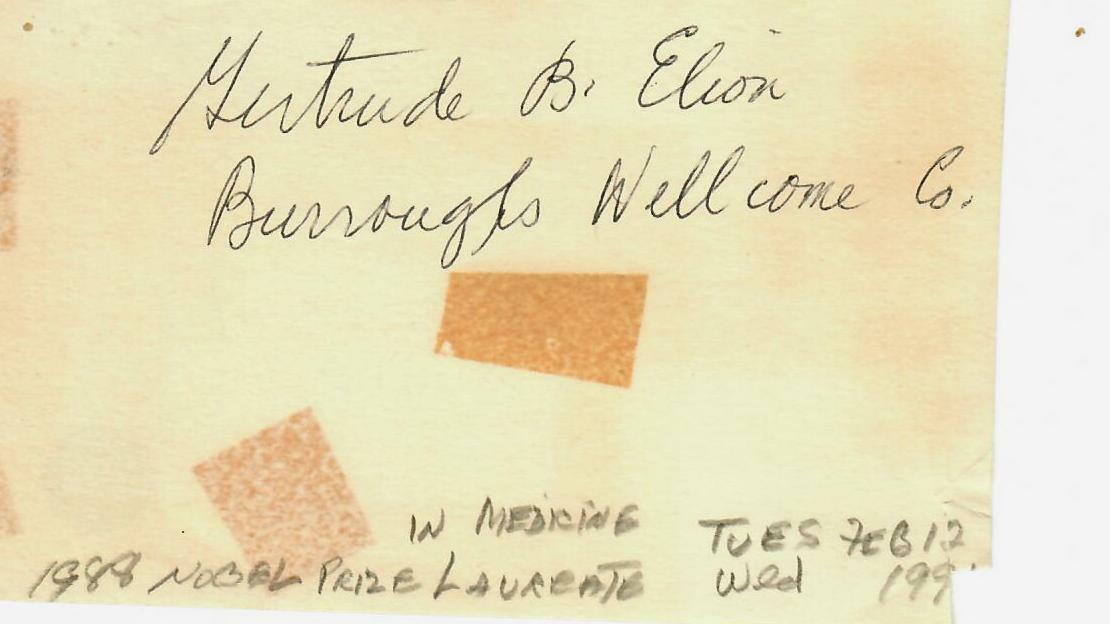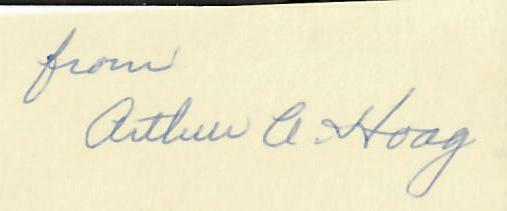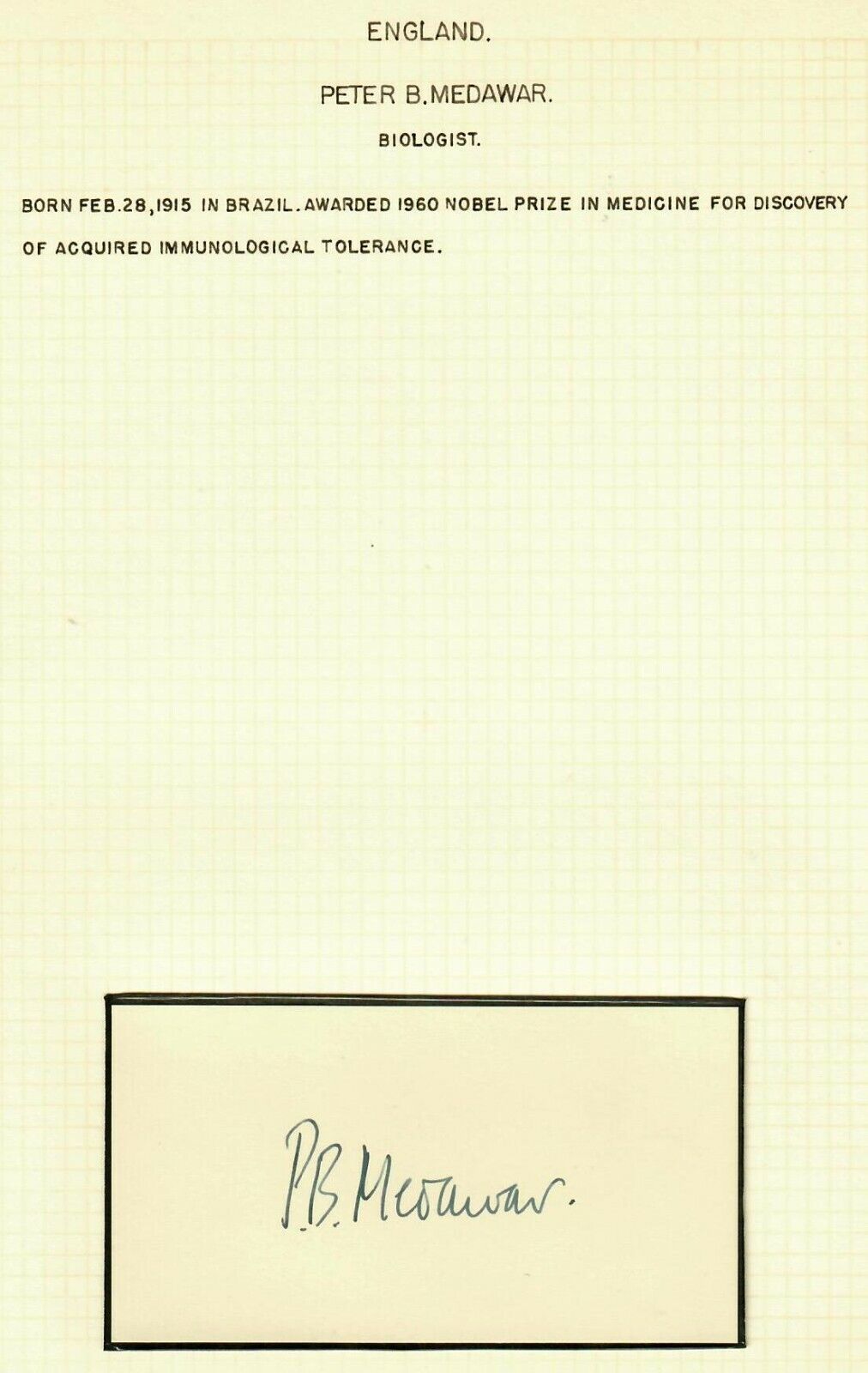-40%
"Nobel Prize in Medicine" Gertrude B. Elion Signed Album Page Todd Mueller COA
$ 73.91
- Description
- Size Guide
Description
Up for auction the"Nobel Prize in Medicine" Gertrude B. Elion Signed Album Page.
This item is certified authentic by Todd Mueller Autographs and comes with their Certificate of Authenticity.
ES-4962
Gertrude "Trudy"
Belle Elion
(January 23, 1918 – February 21, 1999) was an
American
biochemist
and
pharmacologist
, who shared the 1988
Nobel Prize in Physiology or Medicine
with
George H. Hitchings
and
Sir James Black
for their use of innovative methods of
rational drug design
for the development of new drugs. This new method focused on understanding the target of the drug rather than simply using trial-and-error. Her work led to the creation of the
AIDS
drug
AZT
. Her well known works also include the development of the first
immunosuppressive drug
,
azathioprine
, used to fight rejection in
organ transplants
, and the first successful antiviral drug,
acyclovir
(ACV), used in the treatment of herpes infection.
Elion was born in
New York City
on January 23, 1918, to parents Robert Elion, a
Lithuanian
Jewish immigrant and a dentist, and Bertha Cohen, a Polish immigrant. Her family lost their wealth after the
Wall Street Crash of 1929
. Elion was an excellent student who graduated from
Walton High School
at the age of 15. When she was 15, her grandfather died of stomach cancer, and being with him during his last moments inspired the multi talented Gertrude to pursue a career in science and medicine in college. She was
Phi Beta Kappa
at
Hunter College
, which she was able to attend for free due to her grades, graduating
summa cum laude
in 1937 with a degree in chemistry. Unable to find a paying research job after graduating because she was female, Gertrude worked as a secretary and high school teacher before working in an unpaid position at a chemistry lab. Eventually, she saved up enough money to attend New York University and she earned her M.Sc. in 1941, while working as a high school teacher during the day. In an interview after receiving her Nobel Prize, she stated that she believed the sole reason she was able to further her education as a young female was because she was able to attend Hunter College for free. Her fifteen financial aid applications for graduate school were turned down due to gender bias, so she enrolled in a secretarial school, where she attended only six weeks before she found a job.
Unable to obtain a graduate research position, she worked as a food quality supervisor at
A&P
supermarkets and for a food lab in New York, testing the acidity of pickles and the color of egg yolk going into mayonnaise. She moved to a position at Johnson and Johnson that she hoped would be more promising, but ultimately involved testing the strength of sutures. In 1944, she left to work as an assistant to George H. Hitchings at the Burroughs-Wellcome pharmaceutical company (now
GlaxoSmithKline
) in
Tuckahoe, New York
. Hitchings was using a new way of developing drugs, by intentionally imitating natural compounds instead of through trial and error. Specifically, he was interested in synthesizing antagonists to nucleic acid derivatives, with the goal that these antagonists would integrate into biological pathways. He believed that if he could trick cancer cells into accepting artificial compounds for their growth, they could be destroyed without also destroying normal cells. Gertrude synthesized anti-metabolites of
purines
, and in 1950, she developed the anti-cancer drugs
tioguanine
and
mercaptopurine
.
She pursued graduate studies at night school at
New York University Tandon School of Engineering
(then Brooklyn Polytechnic Institute), but after several years of long-range commuting, she was informed that she would no longer be able to continue her doctorate on a part-time basis, but would need to give up her job and go to school full-time. Elion made a critical decision in her life, and stayed with her job and give up the pursuit of her doctorate. She never obtained a formal
Ph.D.
, but was later awarded an honorary Ph.D. from New York University Tandon School of Engineering (then Polytechnic University of New York) in 1989 and an honorary
S.D.
degree from
Harvard
University in 1998. While Elion had many jobs to support herself and put herself through school, Elion had also worked for the
National Cancer Institute
,
American Association for Cancer Research
, and
World Health Organization
, among other organizations. From 1967 to 1983, she was the Head of the Department of Experimental Therapy for
Burroughs Wellcome
. She officially retired from Burroughs and Wellcome in 1983. She was affiliated with
Duke University
as Adjunct Professor of Pharmacology and of Experimental Medicine from 1971 to 1983 and Research Professor from 1983 to 1999. During her time at Duke, she focused on mentoring medical and graduate students. She published more than 25 papers with the students she mentored at Duke.
Even after her retirement from Burroughs Wellcome, Gertrude continued almost full time work at the lab. She played a significant role in the development of AZT, one of the first drugs used to treat HIV and AIDS. She also was crucial in the development of Nelarabine, which she worked on until her death in 1999.
Rather than relying on trial-and-error, Elion and Hitchings discovered new drugs using rational drug design, which used the differences in biochemistry and metabolism between normal human cells and
pathogens
(disease-causing agents such as cancer cells, protozoa, bacteria, and viruses) to design drugs that could kill or inhibit the reproduction of particular pathogens without harming human cells. The drugs they developed are used to treat a variety of maladies, such as leukemia, malaria, lupus, hepatitis, arthritis, gout, organ transplant rejection (
azathioprine
), as well as herpes (
acyclovir
, which was the first selective and effective drug of its kind). Most of Elion's early work came from the use and development of
purine
derivatives. Elion's research contributed to the development of:










